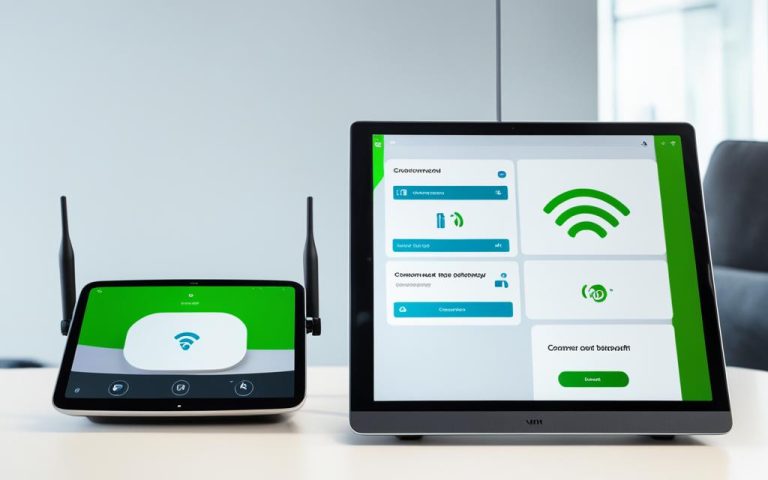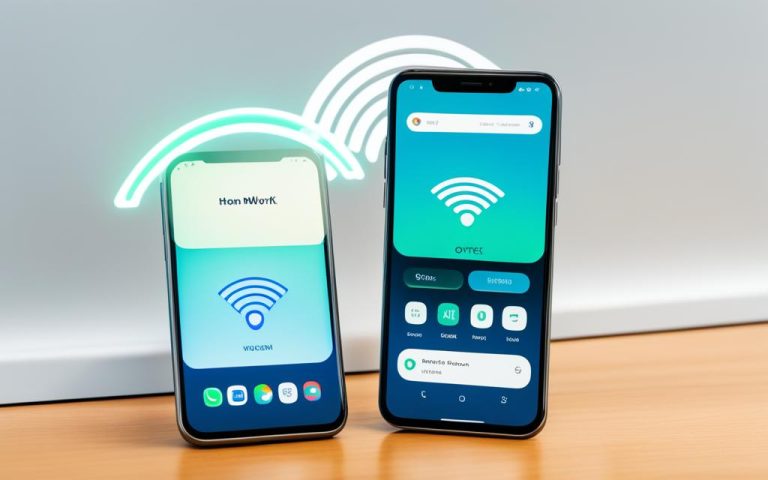Reliable and fast Wi-Fi has become a crucial amenity in the hospitality industry. It plays a significant role in enhancing guest experiences, elevating comfort, and connectivity in hotels and resorts. In this article, we will explore the benefits of Wi-Fi for the hospitality industry and the key strategies that can be implemented to provide a seamless and secure connectivity experience for guests.
Guest experiences are paramount in the hospitality industry. Visitors expect seamless connectivity during their stay, enabling them to connect with loved ones, access information, and accomplish business-related tasks. Hotels and resorts that prioritize Wi-Fi as an essential service can enhance guest satisfaction and attract repeat business, ultimately driving revenue and setting themselves apart from competitors.
The Importance of Wi-Fi for Guest Satisfaction
Reliable Wi-Fi is essential for guest satisfaction in the hospitality industry. Guests rely on the internet for various activities, including booking accommodations, staying connected with friends and family, and completing work-related tasks. Hotels that provide fast and dependable Wi-Fi experience higher guest satisfaction ratings and are more likely to attract repeat business and positive word-of-mouth marketing. Business travelers, in particular, prioritize high-speed internet access and are more likely to choose hotels that offer reliable Wi-Fi.
The Impact of Reliable Wi-Fi on Guest Experience
A positive experience begins with reliable Wi-Fi. Imagine checking into a hotel after a long journey and not being able to connect to the internet or facing frequent disruptions. It would be frustrating and could negatively impact the guest’s perception of the hotel’s service quality. On the other hand, when guests can access a strong and stable Wi-Fi connection, they feel more at ease and satisfied with their overall stay.
With reliable Wi-Fi, guests can:
- Effortlessly stream their favorite movies and TV shows during downtime
- Stay connected with friends and family through video calls
- Complete important work tasks or attend virtual meetings
- Access information about local attractions and amenities
These capabilities enhance the guest experience and contribute to a positive impression of the hotel.
The Role of Wi-Fi in Business Travel
Business travelers, in particular, rely heavily on Wi-Fi for their work-related activities. Whether it’s checking emails, participating in video conferences, or accessing corporate systems, a reliable Wi-Fi connection is critical for their productivity. Hotels that cater to business travelers understand the importance of providing fast and dependable internet access. By offering reliable Wi-Fi, hotels can attract and retain business travelers, ensuring their satisfaction and continued loyalty.
Guest Satisfaction and Positive Word-of-Mouth Marketing
Guest satisfaction directly impacts a hotel’s reputation and success. When guests enjoy a positive experience, they are more likely to recommend the hotel to others, both online and offline. Social media platforms and review websites have become powerful tools for guests to share their experiences. Positive reviews highlighting reliable Wi-Fi and seamless connectivity can attract new guests and help hotels build a positive online presence.
In contrast, negative reviews and complaints regarding Wi-Fi issues can deter potential guests and damage the hotel’s reputation. Repeat business and positive word-of-mouth marketing are essential for the long-term success of hotels in the highly competitive hospitality industry.
| Benefits of Reliable Wi-Fi for Guest Satisfaction |
|---|
| Enhances the overall guest experience |
| Increases guest satisfaction ratings |
| Attracts repeat business |
| Contributes to positive word-of-mouth marketing |
| Builds a strong online reputation |
Providing reliable Wi-Fi is not just a luxury; it is a necessity for hotels striving to meet the evolving needs and expectations of modern guests. By investing in robust network infrastructure and ensuring seamless connectivity, hotels can elevate guest satisfaction, enhance loyalty, and ultimately drive success in the competitive hospitality industry.
The Challenges of Providing Wi-Fi in Hotels
Offering Wi-Fi services in hotels presents unique challenges due to the hotel environment and the increasing demands for network performance.
The hotel environment itself can pose obstacles for wireless networks. The presence of walls, floors, and ceilings can cause signal interference, resulting in poor connectivity and slower speeds for guests. This interference can be particularly problematic in larger hotels with multiple floors and areas that require extensive coverage.
Another challenge is the high number of guests connecting to the Wi-Fi network simultaneously. During peak hours, the network may experience congestion, leading to slow speeds, buffering, and even dropped connections. The constant influx of guests, each with multiple devices, puts a strain on the network infrastructure, impacting the overall network performance and guest experience.
To provide a positive Wi-Fi experience for guests, hotels must overcome these challenges. It requires investing in a robust network infrastructure that can handle the demands of an extensive guest network. Regular network assessments should be conducted to identify areas for improvement and address any potential performance issues.
“The challenges of providing Wi-Fi in hotels can be overcome with careful planning and continuous monitoring of network performance.” – Wi-Fi Solutions Expert
Hotels should consider implementing network optimization solutions, such as Wi-Fi 6 technology and mesh networks, to enhance network performance and coverage. Wi-Fi 6 supports higher data rates and increased capacity, ensuring a better experience in congested areas. Mesh networks eliminate coverage gaps and provide seamless connectivity throughout the property.
Additionally, hotels can improve their guests’ experience by implementing quality of service (QoS) settings. With QoS, different types of traffic can be prioritized, ensuring critical applications receive the necessary bandwidth, while less time-sensitive activities do not impact network performance.
The challenges of providing Wi-Fi in hotels require ongoing management and maintenance. Hotels should regularly update their network infrastructure, deploy firmware updates, and apply security patches to keep the network secure and up-to-date. With proper planning, investment, and management, hotels can overcome these challenges and provide a seamless Wi-Fi experience for their guests.
Comparison of Wi-Fi Challenges in Different Hotel Environments
| Hotel Environment | Challenges |
|——-|————-|
| High-rise hotels | Signal interference due to multiple floors and thick walls |
| Resort properties | Large areas requiring extensive coverage |
| Historic buildings | Thick walls and limited installation options |
| Urban hotels | Congestion from high guest density in a small area |
Solutions for Seamless Wi-Fi Connectivity
Hotels face unique challenges when it comes to providing reliable and seamless Wi-Fi connectivity. Fortunately, there are several innovative solutions available that can help overcome these obstacles and ensure a smooth Wi-Fi experience for guests.
Mesh Networks for Complete Coverage
One of the most effective solutions is the deployment of mesh Wi-Fi networks. These networks use multiple access points strategically placed throughout the property to create a seamless web of connectivity. By eliminating coverage gaps, mesh networks ensure that guests can enjoy uninterrupted Wi-Fi access no matter where they are on the premises. This is especially critical in larger properties where traditional Wi-Fi routers may struggle to provide consistent coverage.
Upgrading to Wi-Fi 6 for Enhanced Performance
Another solution is upgrading to Wi-Fi 6 technology. Wi-Fi 6, also known as 802.11ax, offers significant improvements in speed, capacity, and efficiency compared to previous generations. By adopting Wi-Fi 6, hotels can provide faster and more reliable connectivity, even in congested areas where multiple devices are connected simultaneously. This facilitates seamless browsing, streaming, and other online activities, enhancing the overall guest experience.
Quality of Service Prioritization for Critical Applications
Ensuring quality of service (QoS) is crucial to prioritize critical applications and optimize network performance. By implementing QoS settings, hotels can allocate bandwidth based on the type of traffic, giving higher priority to mission-critical applications such as video conferencing or online transactions. This ensures that guests can enjoy consistent and reliable connectivity for their specific needs, regardless of the number of devices connected to the network.
Additional Solutions for Enhanced Wi-Fi Experience
Several other solutions can further enhance the Wi-Fi experience for hotel guests:
- Guest authentication and access controls: Implementing secure authentication methods ensures that only authorized guests can connect to the Wi-Fi network, enhancing network security.
- Guest network isolation: Segmenting the Wi-Fi network into separate VLANs (Virtual Local Area Networks) adds an extra layer of security by isolating guests’ devices from each other.
- Load balancing: Distributing network traffic evenly across multiple access points helps prevent congestion and ensures optimal performance.
- Network monitoring and analytics: Continuous monitoring and analysis of Wi-Fi performance enable proactive troubleshooting and optimization to maintain high-quality connectivity.

Implementing these solutions is crucial to provide guests with a seamless and reliable Wi-Fi experience throughout their stay. By addressing connectivity challenges, upgrading to advanced technologies, and implementing intelligent network management strategies, hotels can ensure guest satisfaction and loyalty.
Benefits of Wi-Fi Optimization for Hospitality
Wi-Fi optimization plays a crucial role in the hospitality industry, offering a wide range of benefits for hotels and resorts. By harnessing the power of network analytics, establishments can make data-driven decisions and tailor their services to meet the specific needs and preferences of their guests. This approach not only enhances guest experiences but also enables businesses to stay competitive in a fast-paced industry.
Data-Driven Decisions:
Wi-Fi optimization empowers hotels to gather valuable insights about guest behavior and preferences through network analytics. By analyzing patterns and trends, businesses can understand guest expectations and make informed decisions that enhance the overall guest experience. For example, by studying data on in-room entertainment usage, hotels can determine which streaming platforms are most popular among their guests and invest in partnerships or subscriptions accordingly. These data-driven decisions allow hotels to provide personalized service, creating a memorable stay for each guest.
Operational Efficiency:
Managing Wi-Fi networks across multiple properties can be a challenging task. However, with Wi-Fi optimization, hotels can achieve operational efficiency by centralizing network management. A robust Wi-Fi optimization solution provides a unified platform that allows network administrators to monitor, configure, and troubleshoot networks from a single location. Centralized management streamlines operations, eliminates the need for on-site maintenance for every single property, and reduces time spent on network management, freeing up staff to focus on other essential tasks.
Revenue Enhancement:
Wi-Fi optimization offers revenue-enhancing opportunities for hospitality businesses. Personalization strategies, such as proximity engagement and tiered loyalty programs, can be implemented using Wi-Fi analytics data. Proximity engagement leverages Wi-Fi signals to deliver tailored messages, offers, or promotions to guests when they are in specific areas of the property. This technique enhances guest experiences and drives increased on-site spending. Tiered loyalty programs, on the other hand, use Wi-Fi analytics to identify loyal guests and offer exclusive perks and rewards, encouraging repeat visits and driving revenue.
Overall, Wi-Fi optimization in the hospitality industry enables data-driven decisions, enhances operational efficiency, and drives revenue enhancement. By leveraging the power of Wi-Fi analytics, hotels can provide personalized experiences, streamline network management, and implement revenue-driving strategies. The result is increased guest satisfaction, improved operational performance, and enhanced profitability.
Implementation Strategies for Wi-Fi Optimization
Successful implementation of Wi-Fi optimization requires careful planning and execution. Several key strategies can be employed to ensure a seamless and efficient Wi-Fi experience for guests.
Site Survey
Conducting a thorough site survey is an essential first step in the implementation process. By evaluating the layout of the property, potential interference sources such as walls, floors, and ceilings can be identified. This information is crucial for designing an optimized network infrastructure that provides reliable coverage throughout the hotel.
Scalability Planning
Anticipating future needs is vital when implementing Wi-Fi optimization. Scalability planning ensures that the chosen solution can accommodate the hotel’s growing demands without compromising network performance. By considering factors such as guest capacity, increased device usage, and emerging technologies, hotels can future-proof their Wi-Fi infrastructure.
Collaboration with IT Experts
Partnering with experienced IT professionals is essential for designing, implementing, and managing an effective Wi-Fi infrastructure. IT experts possess the expertise and technical knowledge necessary to address complex network configurations, troubleshoot issues, and optimize performance. Their collaboration ensures that the hotel’s Wi-Fi system is well-designed, secure, and capable of meeting guests’ connectivity needs.
Guest Education
Providing clear instructions and educational materials to guests is crucial for optimizing their Wi-Fi experience. Clearly communicate the process for connecting to the network, including any necessary login credentials. Additionally, educate guests on best practices for maximizing Wi-Fi performance, such as positioning themselves within the range of access points and avoiding interference from other devices.
Regular Maintenance
Regular maintenance, including firmware updates and security patches, is vital for maintaining a secure and reliable Wi-Fi network. These updates not only address potential vulnerabilities but also improve network performance and enhance the overall guest experience. By implementing a regular maintenance schedule, hotels can proactively identify and resolve any issues that may arise.
By following these implementation strategies, hotels can optimize their Wi-Fi infrastructure to provide a seamless and exceptional connectivity experience for their guests.
Conclusion
In conclusion, Wi-Fi has become an essential amenity in the hospitality industry, playing a pivotal role in enhancing guest experiences and revolutionizing the way hotels and resorts operate. Reliable and fast connectivity is a key factor in guest satisfaction, attracting business travelers, and driving revenue.
By implementing Wi-Fi optimization solutions and collaborating with IT experts, hotels can ensure seamless and convenient internet access for their guests. Investing in robust network infrastructure and prioritizing guest needs are crucial steps in elevating the guest journey, enhancing profitability, and staying competitive in the industry.
With Wi-Fi for hospitality, properties can offer guests the convenience of staying connected while enjoying a seamless online experience. This industry revolution transforms the way guests interact with the hotel, enabling them to easily book accommodations, connect with loved ones, and complete work-related tasks. The benefits of Wi-Fi in the hospitality industry extend beyond guest satisfaction, driving operational efficiency and revenue enhancement.
In this increasingly digital age, Wi-Fi has become more than just a convenience; it is an expectation. Hotels that embrace this technology and provide seamless connectivity will continue to thrive in the industry, attracting and retaining guests who value a superior online experience.
FAQ
How does reliable Wi-Fi impact guest satisfaction in the hospitality industry?
Reliable Wi-Fi is crucial for guest satisfaction as it allows guests to book accommodations, stay connected with friends and family, and complete work-related tasks. Hotels that provide fast and dependable Wi-Fi experience higher guest satisfaction ratings and are more likely to attract repeat business and positive word-of-mouth marketing.
What challenges do hotels face in providing Wi-Fi?
Hotels face various challenges in providing Wi-Fi, including interference from walls, floors, and ceilings, as well as strained network performance due to a high number of guests connecting. To overcome these challenges, hotels must invest in robust network infrastructure, conduct regular network assessments, and address performance issues to ensure a positive Wi-Fi experience for guests.
What solutions are available for seamless Wi-Fi connectivity in hotels?
To ensure seamless Wi-Fi connectivity in hotels, there are several solutions available. These include deploying mesh Wi-Fi networks to eliminate coverage gaps, upgrading to Wi-Fi 6 technology for improved performance in congested areas, implementing quality of service settings to prioritize critical applications, and utilizing guest authentication and access controls, guest network isolation, load balancing, and network monitoring and analytics.
What benefits does Wi-Fi optimization offer in the hospitality industry?
Wi-Fi optimization in the hospitality industry offers numerous benefits. By analyzing guest behavior and preferences through network analytics, hotels can make data-driven decisions and tailor their services to meet specific guest needs. Wi-Fi optimization also enhances operational efficiency by providing a centralized platform to manage and oversee network operations. Additionally, hotels can enhance revenue through personalization strategies, such as proximity engagement and tiered loyalty programs, which drive guest satisfaction, loyalty, and increased on-site spending.
What are the implementation strategies for Wi-Fi optimization in hotels?
Successful implementation of Wi-Fi optimization in hotels requires careful planning and execution. This includes conducting a thorough site survey to understand the property’s layout and identify potential interference sources, scalability planning to ensure the chosen solution can accommodate future needs, collaborating with experienced IT professionals for designing, implementing, and managing the Wi-Fi infrastructure, providing guest education on connecting to the network, and regular maintenance, firmware updates, and security patches to keep the network infrastructure secure and up-to-date.



















